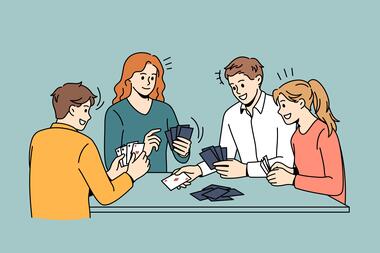
What is Spillnettverket?
The network is an informal way to gather staff and students interested in games and play. Network members are either researching games and/or playful learning, using it in their own teaching or curious about it. Spillnettverket is open for all, across all faculties and sections. We organise in person and digital meetings every semester.
Check out our Teams by clicking on this link
What can you expect of Spillnettverket?
Spillnettverket is an arena shaped by its members. We are trying to organise an in-person seminar every semester, as well as a few digital meetings. Here are some examples of previous events:
- In-person day seminar in Drammen "Research on game and play in education"
- Discussion of research article: Nørgård, Toft-Nielsen & Whitton (2017). Playful learning in higher education: developing a signature pedagogy.
- Presentation and discussion "The definition of game"
In addition, members can freely ask questions or launch discussions in the Teams room. If you have an idea for a meeting or a topic you would like to discuss, feel free to take initiative.
Selection of research publications
-
Brazier, E., & Sandberg, M. H. (2024). Gamer’s perspectives on the First World War: Developing historical consciousness using video games in teacher education. In K. C. Alvestad, K. H. Nordberg, & H. Roll-Hansen (Eds.), New perspectives on educational resources: Learning materials beyond the traditional classroom (1st ed.). Routledge.
-
Cruaud, C. (2016). The playful frame: Gamification in a French-as-a-foreign-language class. Innovation in Language Learning and Teaching, 1–14. https://doi.org/10.1080/17501229.2016.1213268
-
Cruaud, C. (2018a). Designing with Teachers: Contrasting Teachers’ Experiences of the Implementation of a Gamified Application for Foreign Language Learners. In Hans Christian Arnseth, Thorkild Hanghøj, Thomas Duus Henriksen, Morten Misfeldt, Robert Ramberg, & Staffan Selander (Eds.), Games and Education: Designs in and for Learning (pp. 161–178). Brill | Sense. https://doi.org/10.1163/9789004388826_010
-
Cruaud, C. (2018b). Learner Autonomy and Playful Learning: Students’ Experience of a Gamified Application for French as a Foreign Language. ALSIC, 21(1). https://doi.org/10.4000/alsic.3166
-
Cruaud, C. (2023a). A certain degree of freedom: The challenge of learner autonomy in playful foreign language learning. Fremdsprachen Lehren Und Lernen, 52(2), 14–30. https://doi.org/10.24053/FLuL-2023-0019
-
Cruaud, C. (2023b). When design gets in the way: Student learning and digital escape game. Proceedings of the 17th European Conference on Games Based Learning, 17(1), 127–134. https://doi.org/10.34190/ecgbl.17.1.1406
-
Hontvedt, M., Sandberg, M. H., & Silseth, K. (2013). På spill for læring: Om dataspill som læringsressurs i skolen. In S. V. Knudsen (Ed.), Pedagogiske tekster og ressurser i praksis (pp. 199–221). Cappelen Damm akademisk.
-
Sandberg, M. (2023). Dataspill og dannelse: Å lære livsmestring med Peer Gynt-spillet. Acta Didactica Norden, 17(1), 23 sider-23 sider. https://doi.org/10.5617/adno.9045
-
Sandberg, M. H. (2019). «Slipp fangene fri!» – om makt og frigjøring i Minecraft: Education Edition. Journal for Research in Arts and Sports Education, 3(1), 23–42. https://doi.org/10.23865/jased.v3.1330
-
Sandberg, M. H. (2023). Peer Gynt: From Play to Game. Ibsen Studies, 23(1), 60–93. https://doi.org/10.1080/15021866.2023.2214998
-
Sandberg, M. H., & Silseth, K. (2021). Being Peer Gynt: How students collaboratively make meaning of a digital game about a literature classic. E-Learning and Digital Media, 18(6), 581–598. https://doi.org/10.1177/20427530211022928